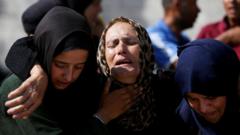As the possibility of a cease-fire looms, both Israeli and Palestinian factions focus on the complexities of negotiations, with Hamas insisting on a lasting solution while Israel remains cautious about military disarmament.**
Uncertain Outcomes: The State of Cease-fire Talks Between Israel and Hamas**

Uncertain Outcomes: The State of Cease-fire Talks Between Israel and Hamas**
Tensions rise as both sides await Hamas's decision on a potential 60-day cease-fire proposal amid ongoing war.**
As the war between Israel and Hamas stretches into its second year, both parties find themselves at a critical juncture regarding the potential for a cease-fire. On July 3, 2025, observers from both sides awaited Hamas's response to a newly proposed 60-day truce, which includes provisions for the release of hostages.
A significant issue under discussion is whether Hamas believes the latest cease-fire proposal includes adequate guarantees that negotiations will ultimately lead to a lasting resolution of the conflict—a war that has decimated Gaza and resulted in substantial loss of life. Hamas's leadership has clarified that any temporary cease-fire must set the groundwork for a definitive end to hostilities. Meanwhile, Israeli Prime Minister Benjamin Netanyahu has made it clear that any cease-fire must come with assurances regarding the disarmament of Hamas's military capabilities.
Hussam Dajani, a political analyst based in Gaza, reinforced this sentiment by stating, "Hamas’s focus is on ending the war." An Israeli official indicated that a response from Hamas could arrive imminently, either today or tomorrow, underscoring the urgency of the situation. Regardless of their decision, it seems that both sides would still require additional negotiation time to finalize the details of any prospective cease-fire before it could be enacted.






















